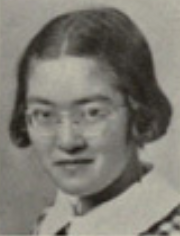Marii Hasegawa | |
|---|---|
 Marii Kyogoku (later Hasegawa), from the 1938 yearbook of the University of California, Berkeley | |
| Born | September 17, 1918 |
| Died | July 1, 2012 |
| Nationality | American |
| Education | BA from University of California at Berkeley in 1938 |
| Known for | peace activist, national president of the Women's International League for Peace and Freedom 1971–1975 |
| Successor | Naomi Marcus |
Marii Hasegawa (September 17, 1918 – July 1, 2012 [1]), born Kyogoku Marii, was a peace activist, known for her fifty years of work with the Women's International League for Peace and Freedom, including serving as its president during the Vietnam War.
Early life and education
Kyogoku was born in Hiroshima, Japan, the daughter of Itsuzo Kyogoku and Kiyo Kyogoku. Her family moved to the United States in 1919, after her father, a Buddhist priest, was assigned to serve Buddhists in California. [2] She lived in Lompoc as a teenager, [3] and graduated from the University of California, Berkeley with a BA in home economics in 1938. [4] [5]
In 1942, Kyogoku and her family were interned at the Topaz War Relocation Center by the U.S. government due to Executive Order 9066. [6] [7] They were forcibly confined there for three years, and in 1945 the family was released and moved to Philadelphia.
Career and activism
While in Philadelphia, Hasegawa began work with the Women's International League for Peace and Freedom (WILPF), a peace-seeking non-governmental organization that had vehemently opposed the internment of Japanese Americans and helped to relocate and readjust freed Japanese. She would hold varying roles within WILPF for the next fifty years, such as the chair of its Membership and Extension Committee from 1960 to 1965, its consultant to committees from 1965 to 1968, and its national president from 1971 to 1975. [8] Her presidency of the organization was during the Vietnam War. Hasegawa organized protests against the war and led a peace delegation to North Vietnam. [4] [9] [10]
Hawegawa received the Niwano Peace Prize in 1996. [11]
Personal life and legacy
She moved to South Hadley, Massachusetts in 2001, where she continued to be active in working for peace and inter-religious cooperation until her death on July 1, 2012. In 2012, a documentary, Marii Hasegawa: Gentle Woman of a Dangerous Kind, was shown at film festivals. [12] She was named one of the Library of Virginia's Virginia Women in History in 2018. [13]
See also
References
- ^ "Marii K. Hasegawa". genealogy bank. Retrieved 13 October 2013.
- ^ "Kyogoku, Itsuzo". The Fresno Bee. 1953-09-08. p. 27. Retrieved 2023-01-19 – via Newspapers.com.
- ^ "Marii Kyogoku Honors Faculty at Japanese Dinner". The Lompoc Record. 1934-06-15. p. 13. Retrieved 2023-01-19 – via Newspapers.com.
- ^ a b Gilhool, Gillian (2004-03-22). "Generations of courage: Japan and the legacy of World War II. (Niwano Peace Foundation)". Women's International League for Peace and Freedom. Archived from the original on 2012-05-05. Retrieved 2009-05-17.
- ^ Berkeley, University of California (1938). Commencement. p. 40.
- ^ "National Archives: Marii Kyogoku". Retrieved 2019-08-17.
- ^ "35 Attend First Buddhist Service in Cleveland". Topaz Times. 1944-12-30. p. 8. Retrieved 2023-01-19 – via Newspapers.com.
- ^ "Women's International League for Peace and Freedom Collect, PART III: U.S. SECTION, Series A, 4, 1960-1999 -- Part 1: Committees". Swarthmore College. Archived from the original on 2009-03-26. Retrieved 2009-05-17.
- ^ "Past Presidents Recommend Selling WILPF Building in Philadelphia". Women's International League for Peace and Freedom. Archived from the original on 2009-05-13. Retrieved 2009-05-17.
- ^ Brinson, Betsy. "History and Archives: The Vietnam Summer Project". Archived from the original on 2008-07-25. Retrieved 2009-05-17.
- ^ "Niwano Peace Prize Recipient to Speak". Richmond Times-Dispatch. 1996-05-22. p. 21. Retrieved 2023-01-19 – via Newspapers.com.
- ^ Lohmann, Bill (2012-04-23). "Film's a tribute to activist, and persistence". Richmond Times-Dispatch. pp. B1. Retrieved 2023-01-19 – via Newspapers.com.
- ^ "Virginia Women in History 2018 Marii Kyogoku Hasegawa". www.lva.virginia.gov. 30 June 2016. Retrieved 5 October 2023.